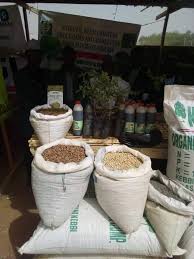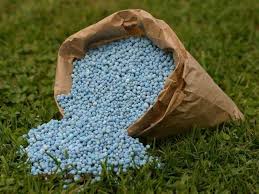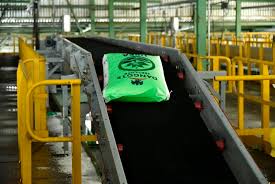![]()
If you’ve landed on this article page, you’re probably searching for a
good business idea—an idea that’s light on the pocket but heavy on
returns, promising both a fulfilling journey and potential profit.
|
How To Start A Lucrative Fertilizer Production Business In
Nigeria
Fertilizer production business is an essential aspect of
agriculture that is responsible for the production of
fertilizers needed to enhance crop yield. The importance of
fertilizer in agriculture cannot be overemphasized as it
contributes significantly to food security in Nigeria and
Africa.
Nigeria spends about $2 billion annually on fertilizer
importation to meet the high demand for crop production. This
highlights the significant role fertilizer production business
can play in the Nigerian and African economy.
Fertilizer production: The primary business opportunity in
fertilizer production is the production of various types of
fertilizers such as nitrogen, phosphorus, and potassium
fertilizers, as well as complex fertilizers that contain a
combination of these nutrients.
Fertilizer distribution: After production, fertilizers need to
be distributed to farmers. A business opportunity exists in
setting up a distribution network to ensure that fertilizers
reach farmers in a timely and efficient manner.
Fertilizer blending: Another business opportunity is in
fertilizer blending, which involves mixing different types of
fertilizers to create a customized blend that meets the specific
nutrient needs of a particular crop or soil type.
Soil testing: Farmers need to know the nutrient content of their
soil in order to determine the type and amount of fertilizer to
use. Soil testing services can provide farmers with this
information and create a business opportunity for soil testing
companies.
Fertilizer application services: Fertilizer application services
involve applying the right amount of fertilizer to a field to
maximize crop yields. Companies can offer this service to
farmers who lack the equipment or knowledge to do it themselves.
Fertilizer recycling: Recycling of organic waste such as animal
manure, food waste, and other agricultural residues into organic
fertilizers presents an opportunity for businesses to generate
revenue.
Fertilizer exportation: Fertilizer production presents an
opportunity for exportation to other African countries or
overseas markets.
Fertilizer importation: Businesses can also import fertilizers
from other countries to sell in the local market.
Fertilizer storage: Fertilizers require proper storage
facilities to maintain their quality. Businesses can offer
storage services for fertilizer manufacturers or distributors.
Fertilizer consultancy: Fertilizer consultancy services can
provide farmers with advice on the appropriate fertilizer types,
application rates, and timing, thereby creating a business
opportunity for consultants.
Fertilizer education: Businesses can provide education and
training to farmers on the proper use of fertilizers and their
benefits.
Fertilizer sales and marketing: The sales and marketing of
fertilizers to farmers and retailers present another business
opportunity. This includes advertising, promotional campaigns,
and distribution channel management.
Organic fertilizer production: With the growing demand for
organic food, organic fertilizer production presents a business
opportunity for businesses to produce and sell organic
fertilizers.
Fertilizer equipment supply: Fertilizer production requires
equipment such as mixers, conveyors, and packaging machines.
Businesses can supply this equipment to manufacturers or rent
them out to farmers.
There are various types of fertilizer production businesses in
Nigeria and Africa. Some of the most common types are:
Organic Fertilizer Production Business: This type of fertilizer
is made from organic waste materials, such as crop residue,
animal manure, and food waste.
Nitrogen fertilizers: These fertilizers contain nitrogen as the
main nutrient and are used to promote vegetative growth and
enhance crop yields. Some common nitrogen fertilizers include
urea, ammonium nitrate, and ammonium sulfate.
Phosphorus fertilizers: These fertilizers contain phosphorus as
the main nutrient and are used to promote root growth, seed
formation, and flower production. Some common phosphorus
fertilizers include triple superphosphate, diammonium phosphate,
and single superphosphate.
Potassium fertilizers: These fertilizers contain potassium as
the main nutrient and are used to promote fruit formation,
increase disease resistance, and improve crop quality. Some
common potassium fertilizers include potassium chloride,
potassium sulfate, andpotassium nitrate.
Liquid Fertilizer Production Business: This type of fertilizer
is produced in liquid form and can be applied directly to the
soil.
Granular Fertilizer Production Business: This type of fertilizer
is produced in granular form and can be applied by spreading it
over the soil.
Foliar Fertilizer Production Business: This type of fertilizer
is applied directly to the leaves of plants.
Slow-Release Fertilizer Production Business: This type of
fertilizer is designed to release nutrients slowly over a period
of time.
Compound Fertilizer Production Business: This type of fertilizer
is made by combining two or more nutrient sources.
Set up your production facility: Choose a suitable location for
your production facility and install the necessary equipment for
producing and packaging your fertilizers.
Source raw materials: Source high-quality raw materials such as
nitrogen, phosphorus, and potassium for your fertilizers.
Develop a distribution network: Develop a distribution network
to get your fertilizers to the market.
Market your fertilizers: Create a marketing plan to promote your
fertilizers to farmers and other potential customers.
Types Of Equipment & Tools Used In The Fertilizer Production
Business In Nigeria or Africa
Here are some common types of equipment used in the processing,
packaging, and supply of fertilizers in Nigeria and Africa:
Mixer: Used to mix the various raw materials required for
fertilizer production.
Crusher: Used to crush the raw materials before mixing.
Granulator: Used to produce the granules that make up the final
fertilizer product.
Dryer: Used to dry the fertilizer granules before packaging.
Packaging machine: Used to package the finished fertilizer into
bags, boxes or other containers.
Weighing scale: Used to weigh the fertilizer during packaging
process to ensure accurate quantity.
Forklift: Used to move heavy bags or containers of fertilizer
within the production and storage facilities.
Conveyor belt: Used to transport raw materials, finished product
and packaging materials throughout the production process.
Palletizing machine: Used to stack and wrap pallets of packaged
fertilizer for ease of storage and transportation.
Having this equipment and more is essential to ensure the
efficient production, packaging and supply of fertilizer in
Nigeria and Africa.
Because the application of chemical fertilizers has caused soil
compaction and degradation of agricultural products, resulting
in low crop yields, it is encouraged that the use of organic
fertilizers instead of chemical fertilizers, and has issued
corresponding subsidy policies and preferential policies.
Promoting the development of the organic fertilizer industry, it
also gives the organic fertilizer industry good opportunities
and good market development expectations. With the support of
the policy, investors who previously held a wait-and-see
attitude towards the organic fertilizer industry are also
assured of investing in the establishment of an Organic
Fertilizer Plant. So, how much does it cost to start a
processing organic fertilizer factory? Let’s have a chat.
The fertilizer production business in Nigeria presents a
significant opportunity for entrepreneurs and investors to tap
into the growing demand for fertilizers in the agricultural
sector. With the ever-increasing population and the need for
food security, the demand for fertilizers is expected to rise in
the coming years. The benefits of fertilizers in promoting crop
yields, improving soil fertility, and reducing post-harvest
losses cannot be overemphasized. However, starting a fertilizer
production business in Nigeria
comes with its challenges such as inadequate
infrastructure, high production costs, and government
regulations. Get our training guide reveals key insights on profitability in setting up your own Fertilizer Production Business you will learn the best way to market and profit from the business. Most especially, you will learn the exact costs of the materials and equipment you need for your Fertilizer Production Business The body of this work is formed from consulting experienced and relevant people running the business to get first-hand information about the success secrets and marketing strategies deployed to achieve business success.
|







